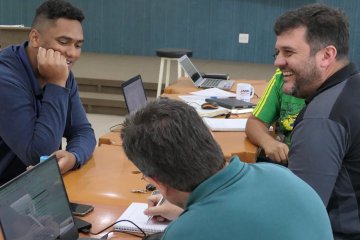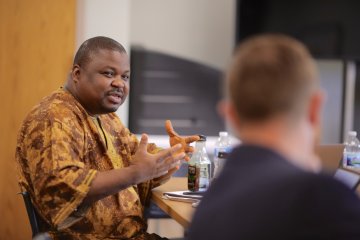An Overlooked Mission Strategy
The year was 2006. I was studying in seminary with an eye toward the unreached peoples of the world and the 10/40 Window. But at the time, I also remember many conversations about gospel needs in our own country, especially in urban centers and in regions like New England. Among aspiring church planters and theological educators, there was a strong emphasis on developing strategies for reaching these unreached areas within the US.
I specifically remember ministry representatives and mission recruiters coming to our seminary and speaking of the desperate need for gospel workers in cities like Boston. They referenced the decline of the church and the lack of faithful witness. The need was urgent, and the plea was for some to answer the call and go.
An Overlooked Revival
Perhaps you can appreciate a bit of my perspective and surprise, then, when I recently came across a study published in 2014 by Marilynn Johnson titled, “‘The Quiet Revival’: New Immigrants and the Transformation of Christianity in Greater Boston.” In it, Johnson chronicles church growth in Boston at a time when most evangelicals were lamenting its decline. In the latter half of the 20th century, while quite a few inner-city congregations migrated to the suburbs and many mainline churches inched toward extinction, a new wave of believers came ashore in eastern Massachusetts and started Korean, Chinese, Brazilian, and Haitian churches, only to name a few.
In fact, according to Johnson, “Between 1980 and 2000, the number of Protestant churches in [Boston] more than doubled, from 203 to 412, the majority of which were foreign-language congregations.” Those numbers are astonishing. Johnson further notes that many of those churches tended to be more evangelical and theologically conservative than their mainline counterparts. They also tended to be more Pentecostal.
“Between 1980 and 2000, the number of Protestant churches in [Boston] more than doubled, from 203 to 412, the majority of which were foreign-language congregations.”
That may be one reason why many of those churches flew under the radar, so to speak, of the ministry representatives coming to my Baptist and Reformed seminary. But perhaps it’s also because God’s quiet work among immigrant peoples isn’t as easy to recognize when you’re in the majority culture.
An Effective Strategy
For me, the most compelling aspect of Johnson’s research isn’t necessarily how it confronts stereotypes of immigration or statistics of church growth. Instead, I find more interesting her observations about how this rapid church expansion happened. It wasn’t owing simply to the influx of Christian expatriates but also to the efforts of local Bostonians who came alongside and supported these fledgling congregations.
Johnson writes, “This transformation of urban Protestantism is often portrayed as a spontaneous development springing from the imported religious fervor of newly arrived immigrants.” However, she observes that “the process in Boston has been more organized and collaborative, as native-born evangelicals were instrumental in facilitating what they called ‘the quiet revival.’”
For example, some evangelical congregations in Boston helped immigrant believers to learn English, navigate legal issues, draft church bylaws, and acquire spaces for worship. Ministries like the Emmanuel Gospel Center also helped to provide immigrant churches with places to gather, but they simultaneously supported immigrant church leaders by providing access to Spanish-language resources and personal mentoring.
This is the heart behind TLI’s vision to serve diaspora pastors. We desire to see local churches in cities throughout the US realize the incredible potential when we come alongside immigrant churches. Just as the stagnating and declining church in Europe is experiencing a revival through African and Asian believers breathing new life into dead cathedrals and quiet chapels, we believe God can do (and already is doing) the same in this land. So we believe an effective mission strategy for seeing the gospel spread—to reach the unreached—is one where we invest in diaspora churches by training their pastors.
Yes, many of these immigrant church leaders lack opportunities for biblical training. Yes, many of them also bring different cultural traditions and theological perspectives to the classroom. And, yes, many operate with beliefs and practices that might make us uncomfortable. But many of them are also committed to God’s word, to fervent prayer, to bold evangelism, and to historical Christian ethics. What’s more, many of them know what it is to stand for their faith in the face of suffering.
But what if we could learn from their faithfulness even as we equip them to study God’s word carefully and to preach it more faithfully? What if, in that process, all our churches are strengthened?
An Open Question
Johnson concludes her study with a question for churches in cities across the US. In her opinion, the results in Boston are undeniable. An influx of new immigrant believers working in collaboration with existing evangelical churches has combined to revitalize the ecclesial landscape of greater Boston. “Whether other cities will follow this trend remains to be seen,” she says.
This is where we believe TLI’s Diaspora Training can make a difference, as we mobilize and mentor majority culture churches to come alongside and strengthen ethnic-specific churches in their own communities. In urban areas with significant church decline and gospel deficiencies, we can partner with local churches to equip and empower diaspora pastors and their congregations. We can build relationships that lead to gospel partnership for the sake of our cities—and our nation.
Over the last few decades, the nations of the world have reached our cities. Now, many of our immigrant and refugee brothers and sisters are trying to reach those same unreached cities with the gospel. But there remains a question. Will existing evangelical churches effectively respond to this development? The answer to that question, Johnson believes, “will likely shape the future of urban religious life” in America for decades to come.
Elliot Clark (MDiv, The Southern Baptist Theological Seminary) served in Central Asia as a cross-cultural church planter along with his wife and children. Since 2016, he has worked with TLI equipping indigenous church leaders overseas and diaspora pastors within the U.S. He is the author of Evangelism as Exiles and Mission Affirmed.



